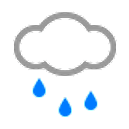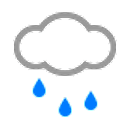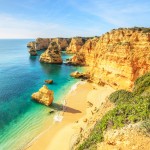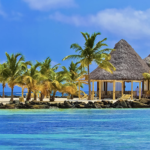What's the Weather like in Algarve in August
July and August are the hottest months of the year in the Algarve region, and also the sunniest and driest. Due to the decreasing daylight amounts, August has slightly less sunshine than July, with an average of 353 hours of bright sunshine at the region's capital, Faro, which comes out at a mean between 11 and 12 hours per day. The daytime temperature reaches an average high of 29°C, and falls to an average of 19°C overnight.
Temperature
Although temperatures mostly stay close to the long-term average, major heat waves occasionally crop up and temperatures well in excess of 35°C have been recorded. There was a severe heat wave at the end of July 2003 and during early to mid-August 2003 (a heat wave which also consumed most of the rest of central and Western Europe) which contributed heavily to widespread mountain fires.
The 2003 European heat wave was the hottest summer on record in Europe. August 1st, 2003 was the hottest day recorded in centuries, with night temperatures exceeding well above 30°C. Over the next coming weeks a strong and hot Sirocco wind contributed to the spread of extensive forest-fires. Over 5% of the Portugal's countryside and 10% of the forests were destroyed due to the wild fires. It is also estimated that approximately 18 people died in the flames in the whole of Portugal and temperatures as high as 48°C were recorded in some areas of the country.
Rain
Many Augusts are completely free from rain, especially near the coast, but on rare occasions short-lived thundery downpours crop up. On average there is only one day per August with measurable rainfall at Faro, with a mean monthly total of 4mm.
The probability of precipitation at this time of year is very low at only 3% to 8%, compared to January where rainfall is 36% likely. Over the entire year the most common forms of precipitation are moderate rain, light rain, thunderstorms and drizzle. August also lies within the warm season, which lasts from June 23rd to September 14th. During this period of time there is a 6% average chance that precipitation will be observed at some point during a given day. When it does occur usually it is mostly in the form of moderate rain (45% likely).
Humidity
Humidity at this time of year is generally low; the relative humidity typically ranges from a comfortable 41% to a humid 87%. The air is typically driest around July 12th, at which time the relative humidity drops just below 50%, which is still considered comfortable. The most humid time of the year is around January 3rd where humidity levels can exceed 94%, which is considered as very humid.
One thing to bare in mind is that humidity levels are usually lowest when temperatures are high. The dew point is often a better way to measure how comfortable a person will find the weather than relative humidity levels, as it relates to whether perspiration will evaporate from the skin.
Lower dew points tend to feel drier and higher dew points usually feel more humid. There are two periods in the year that are most comfortable: the first is between January 1st and July 13th and the second is between September 15th and December 31st. August does not lie in between either of these periods and can be relatively muggy at 12°C to 19°C.
Winds
Throughout the year typical wind speeds vary from 0 m/s to 8 m/s, which is a calm to moderate breeze, rarely ever exceeding 11 m/s. During August the average wind speed is a low and calm 3 m/s. Compared to April 7th, at which time the average daily maximum wind speed can reach 8 m/s.
Cloud cover at this time of year generally very clear. The sky is usually cloudiest in the Algarve on January 1st and clearest on July 26th. The clearest part of the year begins around June 3rd and lasts up until the end of September.
Sea Temperature
The sea temperature off the coastline is at its warmest during August and September, peaking at around 21°C on average, so this is a good time of year to try swimming or diving off the Atlantic coast.
Beaches for August for Algarve
August is the most popular time of year to visit the beaches, so some of the more popular beaches can end up quite crowded, but the beaches at the Algarve are so numerous that it is usually possible to find a relatively quiet spot.
Ilha de Culatra
For those who would prefer a relatively secluded location, Ilha de Culatra is an island situated off Olhao, and being off the mainland, does not attract as many tourists as some of the other resorts, while boasting pleasant beaches.
Praia Gale
Praia Gale, 4 kilometres west of Albufeira, contains soft sands that are suitable for small children, and a range of reasonable restaurants.
Arrifana Beach
On the other hand Arrifana Beach is another popular option for young families. This blue flag beach is approximately 500m long and is located within the Vicentine Coast Natural Park.
Bars for Algarve in August
Mourisco Cocktail Bar
For some good and varied cocktails, Mourisco Cocktail Bar at Alvor, Portimao is easy to recommend, and this bar, too, features musical entertainment on evenings.
Things to Do in Algarve in August
Fortress of Sagres
There are some good natural attractions and landmarks in the Algarve. The Fortress of Sagres at Sagres on the coast of the Algarve is impressively mainly for its views over the nearby bay and ocean. There is an exhibition centre contained within, and on a good day, local fishermen can be spotted fishing around the nearby coastline.
Far and Ride
Popular Far and Ride is one of the Algarve's most prestigious equestrian centres. Relax and chill out as you ride down the sandy tracks on horse back. Conveniently, riding takes place all year round at Far and Ride, as the sun is almost always shining in the beautiful Algarve. The very qualified teachers are recommended by many tourists and locals.
Take up the chance to admire wildlife, golden beaches and spend quality time with friends, family or a partner. Experiencing the sunset or a full moon on horse back will make your holiday.




























